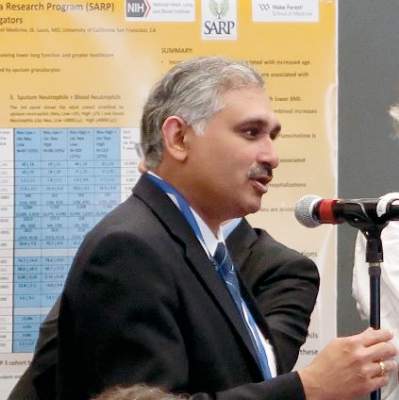FROM ATS 2017
WASHINGTON (FRONTLINE MEDICAL NEWS) – The biologic benralizumab cut glucocorticoid dosage by nearly 75% among patients with severe, uncontrolled asthma, compared with a 25% reduction in dosage among patients using a placebo, according to a study.
In this three-armed, double-blind study of 220 patients, those administered benralizumab every 4 and 8 weeks were 4.09 (95% confidence interval, 2.22-7.57) and 4.12 (95% CI, 2.22-7.57) times as likely to see a reduction in glucocorticoid dose, compared with those in the placebo group, according to investigators (NEJM. 2017 May 21. doi: 10.1056/NEJMoa1703501 ).The study was presented at an international conference of the American Thoracic Society and published simultaneously in the New England Journal of Medicine.
The results of this phase III trial could be significant for patients with severe asthma who must choose between passing on treatment and facing the potential risks associated with glucocorticoid use.
“Frequent or long-term use of systemic corticosteroids can lead to potentially life-threatening complications, including osteoporosis, diabetes, cardiovascular disease, and adrenal suppression,” Parameswaran Nair, MD, PhD , professor at McMaster University, Hamilton, Ont., said in a press release. “We need new, safe therapies that would replace the need for systemic corticosteroids for patients with severe asthma.”
To test benralizumab’s effectiveness, investigators measured a baseline level of glucocorticoid dosage of 220 patients with severe, uncontrolled asthma. Patients were then given one of three treatment options: one dose of benralizumab every 4 weeks, one dose of benralizumab every 8 weeks, or a placebo. All three treatments were decreased each time until minimal dosage was found while still maintaining asthma control. The average age of patients was around 50 years, with the majority of patients in both treatment groups and the placebo group having been female.
The researchers also analyzed patients’ accounts of any worsening asthma symptoms, which were recorded in an electronic asthma daily diary.
Along with the median 75% decrease in glucocorticoid dosage seen in both groups of patients receiving benralizumab, 24 patients (33%) in the 4-week group and 27 patients in the 8-week group (37%) showed a 90% reduction from their baseline glucocorticoid dosage. In contrast, only nine patients (12%) in the placebo group experienced a 90% drop in glucocorticoid use.
The researchers observed an additional finding suggesting benralizumab’s usefulness in a subgroup of patients with a baseline prednisone dose of less than 12.5 mg. These patients were more likely to stop taking their glucocorticoid dose if they were taking benralizumab instead of the placebo. Specifically, patients who took benralizumab every 4 weeks were 5.23 times more likely and those who took the biologic every 8 weeks were 4.19 times more likely to cease using glucocorticoids.
Similar to the current biologics used to treat severe eosinophilic asthma, mepolizumab and reslizumab, benralizumab is a form of a monoclonal antibody. Instead of targeting interleukin-5, benralizumab works against a subunit of the iterleukin-5 receptor. They investigators said this aspect of benralizumab may explain why it was successful in this study.
“Targeting of the alpha-subunit of the iterleukin-5 receptor with benralizumab has potential advantages over existing anti–interleukin-5 therapies,” according to Dr. Nier and fellow investigators. “By targeting the interleukin receptor rather than the cytokine, luminal depletion of eosinophils can occur, which may be related to greater clinical efficiency.”
The investigators noted that FEV1 levels seemed relatively unaffected by benralizumab.
This study was limited by the length of the trials, which lasted 28 weeks. Investigators also note that 20% of the original patients were not used in the final population.
This study was sponsored by, and organized in partnership with, AstraZeneca. All of the investigators reported having a financial or other type of relationship with AstraZeneca.
On Twitter @eaztweets


